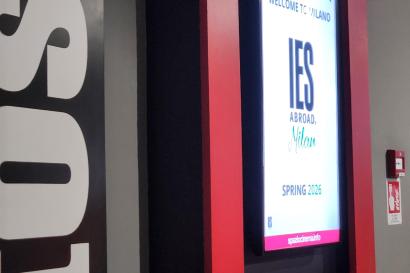I’ve had a severe hard nut allergy (walnuts, almonds, etc.) since I was two years old; it’s always been a part of my life and likely always will be. Back home I have a routine for avoiding an allergic reaction; my apartment-mates know to clean the counters after cooking with nuts to prevent cross-contamination, I know what brands of chocolates are safe to eat, there are certain ethnic cuisines I avoid because they traditionally use a lot of nuts in their recipes, and my family is accustomed to my long conversations with waiters about the ingredients in items on the menu.
When you’re living abroad, everything changes. The language barrier, unfamiliarity with local cuisines, and differences in awareness about food allergies complicate an already delicate situation. My parents were apprehensive about me studying abroad – and for good reason: a split-second lack of vigilance requires me to be hospitalized within twenty minutes. I decided that I refused to let this challenge keep me from fulfilling my dream, and took a number of precautionary measures before I left and after I arrived. I’m sharing what I’ve learned so far in hopes that it will help others with food allergies make an informed decision about studying abroad.
First, it is imperative to become proficient in the language before you go – to the extent that you can ask a waiter or chef what ingredients are in a dish and and explain your allergy, and request to be taken to a hospital if needed. It was also helpful for me to audit an Italian Cuisine and Culture class offered at my college. I learned the names of foods I could and couldn’t eat, as well as some common dishes I might not have known to avoid, such as a sausage common in Milan called ‘mortadella’ which contains pistachios.
I have also found it extremely helpful to be in a home stay. I debated whether it would be better to live in an apartment and cook my own food or to stay with a family, and for a multitude of reasons I chose the home stay. My host family has been very understanding about my allergy, and I have been able to sample many traditional Italian dishes while knowing that I don’t have to worry about what’s in my food. They have also helped me to translate food labels and suggested nut-free snack brands. I do have to be careful eating out, but it helps to go at lower-volume times; a waitress at a pastry shop is much more likely to give you extra attention before or after the lunch rush when there aren’t fifty people shouting orders and waving cash.
Finally, don’t be afraid to stick with a few restaurants or dishes that you know are less likely to have allergens. I order a lot of risotto at restaurants and cold sandwiches at cafes because traditionally these dishes don’t contain hard nuts – and who doesn’t love a giant plate of Parmesan risotto?

Elizabeth Benz
Elizabeth Benz is a lifetime upstate New York resident who never takes the snow brush out of the back seat of her car. Originally from Buffalo, NY, she is a senior Music Education/Violin Performance major and Italian minor at Ithaca College. These three passions were intertwined on a life-changing trip in 2006 to the International Suzuki Method Conference in Turin, Italy, where she not only saw the communicative power of music across young artists from many nationalities, but also fell in love with the language and culture of the country. Eight years later she is fulfilling the promise she made to herself to return to Italy, after completing her senior student teaching practicum. She is particularly interested in observing the emphasis and importance placed on youth music and arts programs across Europe, and returning with ideas to inspire and support her own program at a future teaching job.








